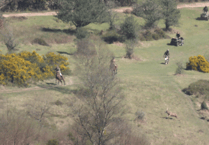CARBON emissions by Exmoor National Park Authority (ENPA) have been halved since it declared a climate emergency in 2019.
The achievement comes as ENPA joins with other UK national parks to become the first in the world to commit to the UN-backed ‘Race to Zero’ initiative, driving action to halve carbon emissions within their landscapes by 2030.
ENPA chairman Andrea Davis said: “As a climate lead myself for Devon County Council, I am delighted at the dedication park authority teams have shown in this solid commitment to tackling climate change.
“We hope by demonstrating the great work we have done and already halving our own emissions through the numerous projects happening across Exmoor, we can now encourage other organisations to think about how they can reduce their carbon emissions and the impact of climate change.”
Ms Davis said Exmoor and others were committed to becoming beacons for a sustainable future, using their partnerships to help meet UK climate change targets while also supporting thriving rural communities.
ENPA was not only reducing emissions, but helping to draw down excess carbon from the atmosphere, with numerous actions in answer to the climate crisis.
From estate work to school activity days, there had been a switch to electric vehicles and tools, installation of electric vehicle charging points across the national park, and a move away from fossil fuels via solar panels, a wind turbine, and a biomass boiler at its Pinkery outdoor education centre powered by wood grown on the authority’s estate.
The authority’s historic Exmoor House headquarters in Dulverton was a listed building which created challenges when applying eco principles, but it now had secondary glazing to improve insulation and reduce energy consumption.
Ms Davis said the authority was working in partnership to support regenerative agriculture schemes such as silvo-pasture, where livestock were grazed around trees to improve soil health and hedgerow planting to offer shade and browsing, extra fodder for livestock, leat creation to aid flood management, and mobile chicken housing to help fly control and to fertilise the ground naturally, reducing reliance on chemical methods.
There were also ‘field to fork’ farm education events to restore lost biodiversity and soil nutrients, improve food security, and transition to more locally grown produce, supporting local businesses but also halving emissions from food eaten in national parks by 2050.
Meadow creation as part of the ‘Sowing the Seeds project’, aimed to revive and restore species-rich grassland across Exmoor.
Orchard and temperate rainforest restoration and supporting sustainable travel were also part of the climate mitigation strategy and ENPA was a partner in the award-nominated ‘Southwest Peatland Partnership’, restoring carbon-storing peatlands across the region.
The field services team which looks after 620 miles of public paths and bridleways also locally makes the gates, stiles, and iconic signposts seen across Exmoor from wood grown and processed in its own tree nursery and local timber operation.
Everything is sawn using electric tools boosted by solar panels and any offcuts go back into the biomass boiler to provide energy for its Exford depot.





Comments
This article has no comments yet. Be the first to leave a comment.